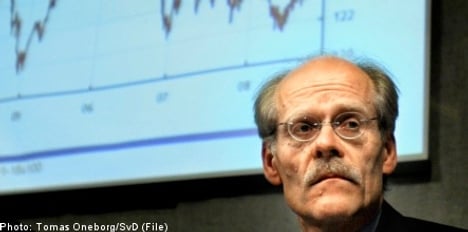The bank announced that the repo rate forecast remained unchanged.
“The Swedish economy remains strong. Underlying inflation is currently low, but is expected to increase as economic activity strengthens. At the same time, CPI inflation is now high as a result of rising mortgage rates,” the Riksbank wrote in a statement.
The Riksbank observed that while underlying inflation remained low in Sweden, it is expected to rise as the rate of wage increases accelerates and spare economic capacity declines.
The bank observed that economic prospects remained largely the same as in February with the repo rate path unchanged in relation to the Monetary Policy Report published in April.
This means that the Riksbank expects a repo rate of 2.5 percent in the first quarter 2012, climbing to 3.2 percent in 2013 and 3.6 percent in 2014.
The Riksbank hiked its growth forecast for 2011. GDP is now expected to climb by 4.6 percent in comparison to a previous estimate of 4.4 percent. The forecast for 2012 has been marginally cut to 2.3, from a previous 2.4 percent.
The Consumer Price Index (CPI) is forecast to climb 3.2 percent this year and 2.8 percent in 2012, up from a previous forecast of 2.5 and 2.1 respectively.
Underlying inflation (CPIF) projections were at the same time cut for 2011, but raise for 2012 and come in just under the 2 percent goal.
Deputy Governors Karolina Ekholm and Lars E.O. Svensson entered a reservation against the decision to raise the repo rate and against the repo rate path of the Monetary Policy Update.
The pair preferred to maintain a repo rate of 1.5 percent and a repo rate path that first rises slower and then faster than that of the Update, to about 3.9 per cent by the end of the forecast period.
Such a repo rate path implies CPIF inflation closer to 2 per cent and a faster reduction of unemployment towards a longer-run sustainable rate.
The minutes from the Executive Board’s monetary policy discussion will be published on May 3rd 2011.
The Swedish krona strengthened marginally against both the US dollar and euro in early trading on Wednesday.



 Please whitelist us to continue reading.
Please whitelist us to continue reading.
Member comments